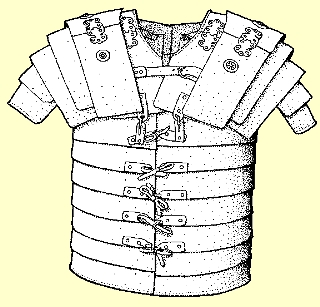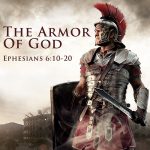NOTE: There is an updated and revised version of this study here: Putting on the Breastplate of Righteousness (Ephesians 6:14b)

Most of you have heard of Paul Harvey, and his famous radio broadcast called “The Rest of the Story.”
Paul Harvey, in his “The Rest of the Story” radio broadcast, tells the story about a young woman named Terry, who, in 1977 wanted to buy a Christmas present for her husband. It was September, so she still had several of months, but she knew exactly what she wanted to get for him, but feared it would be too expensive. It wouldn’t have been too expensive for most families, but on a policeman’s salary, it was sometimes difficult to make ends meet.
Nevertheless, she went down to the store where they sold what she wanted to buy, and looked around until she found just the right one. When she asked the shopkeeper how much, he said, “$127.” Ouch. Her anticipation turned to disappointment as she thought, “That’s just too much for us. We can’t afford it.”
But then she had an idea. So she said to the man, “Though we don’t know each other, perhaps you would allow me to put it on hold. I can pay a little now, and then some more in October and November, and have it paid off by Christmas.”
Well, this was a seasoned businessman, and he knew a trusting person when he saw one. So he smiled and said, “I’ll tell you what. Since your husband is a police officer (as she had talked to him about that), I have every reason to trust you. Why don’t you just give me the first payment today? I’ll wrap it up for you and let you take it home today, and you can come back and pay me later as you get the money.”
She was elated. And she walked out of the store that day with this wonderful present which she was so anxious to give to her husband.
Well, you know how young wives are—barely able to hold a secret or keep in the excitement when they have a gift for someone. So that night, rather than wait for Christmas, she gave the gift to her husband, David. He was thrilled at her thoughtfulness and covered her with hugs and kisses.
Neither David nor Terry realized, however, how significant that simple gift was. As a matter of fact, in the not-too-distant future, it would be the difference between David’s life and death.
A few short weeks later, on October 1, David was working the night shift when he got a call on his police radio. A drugstore robbery was in process. Racing to the scene, he arrived just in time to observe the suspect getting into his car, and speeding away. Quickly, David switched on his siren and began the pursuit. Three blocks later the getaway vehicle suddenly pulled over to the side of the road and stopped.
The suspect was still seated behind the wheel of his car as David cautiously approached the suspect. As he got about three feet away from the driver’s door, it flew open and the suspect fired a .45 caliber pistol straight toward David’s chest.
At 7:00 the next morning, Terry answered the door of her house to see a police officer standing there. Carefully and calmly, he told her he had some bad news and some good news. First, he told Terry that David had been shot while trying to apprehend a robbery suspect.
When she heard this, Terry immediately knew what the good news was, and she was glad that she didn’t wait until Christmas to give her gift to her husband. She was glad the store keeper had been willing to let her pay for the gift later.
Otherwise, her husband, David, would surely have died. You see, the good news was that although David had been shot, he was still alive in the hospital—not with a gunshot wound, but with a deep bruise.
Christmas had come early that year because David had with him the gift his wife could not wait to give—a brand new bulletproof vest. [1] And that, as Paul Havey says, is the rest of the story.
As we continue to look at the spiritual armor God has given us for our spiritual battle, we look at the ancient type of bulletproof vest—back then, they called it the breastplate. Specifically in Ephesians 6:14, Paul calls it the breastplate of righteousness.
Last time, in looking at the first half of verse 14, we talked about the belt of the truth. We saw that the belt on the soldier’s armor, although a seemingly insignificant piece was actually one of the most important pieces. We could say that the belt was the foundational piece, or the unifying piece of armor. But, although the belt is so important, you cannot go into battle with nothing but your belt on. For although it is foundational, it doesn’t provide much protection. All it does is keep the rest of the armor in place. For protection, you need the other pieces of armor.
So the next piece is the breastplate of righteousness. Just as with the belt of truth, we will look at this second piece of the armor in three ways. First, how it was used on the Soldier, second, how it is to be used for us as Christians in spiritual battle, and then finally, how we can put it on for battle.
So let’s begin with what the breastplate did for the soldier.
I. The Breastplate for the Soldier
 Obviously, the breastplate was worn on the chest or torso of the soldier. Although at times, they were made out of leather, the ones worn by soldiers in Paul’s day were most likely made from iron or some other sort of metal. The breastplate was not made from one solid piece of metal the way most of us imagine they were. Most of us, when we think of a breastplate, think of the armor that knights used in medieval England. We think of knights mounted on horses with their lances and broadswords and covered in armor from head to toe.
Obviously, the breastplate was worn on the chest or torso of the soldier. Although at times, they were made out of leather, the ones worn by soldiers in Paul’s day were most likely made from iron or some other sort of metal. The breastplate was not made from one solid piece of metal the way most of us imagine they were. Most of us, when we think of a breastplate, think of the armor that knights used in medieval England. We think of knights mounted on horses with their lances and broadswords and covered in armor from head to toe.
The Roman soldier’s armor was intended to be lighter than that. Remember, the soldiers had to be able to run 24 miles in 5 hours with this armor on. There is no way a medieval, fully armored knight could probably even run five miles in five hours. The breastplate, rather than being made of forged iron, was made of bands or strips of metal tied together with leather. This made it more flexible and maneuverable than the kind of breastplates the knights wore. All of this, of course, was better suited to the type of combat the Roman soldiers found themselves in when out on the field.
Now, since were talking about the soldier on the field, what was its purpose while in battle? Obviously, it was intended to protect the soldier’s vital organs like the heart and lungs. If either of those three things became injured in battle, the soldier is as good as dead. So the breastplate was obviously important. It was made of strips of metal so that it could be light and flexible, and it’s main purpose was to protect the vital organs of the soldier.
So with that in mind, let’s move on to see how the spiritual breastplate is to be used for the Christian in spiritual battle.
II. The Breastplate for the Christian
To begin with, remember that putting on the belt of truth is putting on the Word of God. Studying it. Reading it. Learning it. Putting on the belt of truth is knowing what God’s Word says. It is gaining a knowledge of the Bible. Now, since that is the case, the breastplate of righteousness, which is attached to the belt, remember, is applying the truth of the Bible to our lives.
There is a major difference between understanding the truth, and living the truth. There is a difference between head knowledge and heart knowledge. There is a difference between being able to recite verses and list Bible facts, and actually living or applying those verses and Bible facts to your life.
Do you remember the Pharisees? They were Bible scholars. They were experts of the law. Most of them had the entire Torah—which is the first five books of the Bible—memorized. They knew the history of Israel forward and backward. They prayed and sang the Psalms. They could recite passages from the Prophets. And if you were living at that time, and you were to watch them, you would not only be amazed at how much they knew of the law, but also how obedient they were to it.
But guess what? It was only an outward obedience. It never made it into the heart. And because of this, Jesus reserves some of his most scalding rebukes for them. You can read all about it in Matthew 23, but let me just give you a taste of some of the things he says to them.
In Matthew 23:27-28, he says, “Woe to you, scribes and Pharisees, hypocrites! For you are like whitewashed tombs which indeed appear beautiful outwardly, but inside are full of dead men’s bones an all uncleanness. Even so you also outwardly appear righteous to men, but inside you are full of hypocrisy and lawlessness.” These men were outwardly righteous. They appeared righteous to others. They had all the right words, and all the right actions, and all the right behaviors. But Jesus is saying here, “It doesn’t matter what you look like on the outside, what do you look like on the inside? What does your heart look like?”
And that is what the breastplate is for, to get the truth of God, not just strapped around us, not just so we can quote Scripture—but to get the truth of God inside us, to protect our vital organs from damage—to know it and live it.
The breastplate is applying God’s truth to our lives so that rather than living in sin, we can live holy and righteous before God. Do you want to protect yourself from sin? Do you want to protect your heart from sin? You need to have on the breastplate of righteousness. Which brings us to our third point. How can we, as Christians, put on the spiritual breastplate of righteousness?
III. Putting on the Breastplate
 Just like the belt of truth, we must understand first of all, that the breastplate of righteousness is Gods. When we put it on, it is his armor we are putting on. In Isaiah 59:17, we read that God wears righteousness as a breastplate. And Isaiah 59 reveals that this righteousness is not the positional, imputed righteousness that God gives to all believers the moment they believe in Jesus for everlasting life. Instead, it is the practical, day to day righteousness that God expects and desires all Christians to live by. It is living the holy life.
Just like the belt of truth, we must understand first of all, that the breastplate of righteousness is Gods. When we put it on, it is his armor we are putting on. In Isaiah 59:17, we read that God wears righteousness as a breastplate. And Isaiah 59 reveals that this righteousness is not the positional, imputed righteousness that God gives to all believers the moment they believe in Jesus for everlasting life. Instead, it is the practical, day to day righteousness that God expects and desires all Christians to live by. It is living the holy life.
Just as the actual breastplate on a soldier protects his heart, lungs, and other vital organs, so the breastplate of righteousness, the practical holiness of a life lived in obedience to God, is what protects the heart of a Christian. H. A. Ironside writes, “The breastplate covers the heart of the man, and when we think of the heart we think of the conscience…” [2] In other words, to wear the breastplate of righteousness, we have to protect our heart, the center of who we are, by keeping our conscience pure.
So how do you maintain purity in your life? Well, first of all, it builds on the belt of truth we looked at last time. As you dig daily into the Word of God, and feed your spirit upon the truth of Scripture, you will come across passages which convict you of sin in your life. In such situations, God is using the Bible to conduct spiritual CPR on your heart. He has found an area where you are about to have a spiritual heart attack, or where you are about to be drowned by sin, and so he wants to get your heart beating again through spiritual CPR.
So what is spiritual CPR? It’s an acronym to help us get rid of the sin that infects our lives. The C stands for Confess. The P stands for purify. And the R stands for Repent. Each of the three deals with a different aspect of sin, so let’s look at each individually to see how we can get rid of each kind of sin.
Confession – 1 John 1:9-10
Taking confession first, turn in your Bibles to 1 John 1. I think a lot of people misunderstand confession. Did you know that there is a difference between confession and repentance? We’ll see what repentance is when we get to the R, but for now, let me just explain to you what confession is. Confession is basically admitting you are wrong and saying you are sorry for a sin which you commit that has not become habit forming. Confession should be made after you do something you know was wrong for you to do.
It has to do primarily with those “one time” mistakes. You just blew it on accident. Maybe, for example, you don’t have a problem with anger, but one day, you just explode in anger toward your spouse. Or maybe you don’t have a problem with stealing, but one afternoon, for some stupid reason, you stuffed that pack of gum into your pocket at the store. Confession is for those times. Confession is for those one time acts of sin which you have not frequently repeated before.
To see this, look at 1 John 1:9. “If we confess our sins, He is faithful and just to forgive us our sins and to cleanse us from all unrighteousness.” This verse is often misunderstood. John here is writing about those sins which we commit which are out of character for us. When we commit them, they kind of surprise us as well.
And when this happens, God begins to work on our heart, and says, “Hey, what you did there was wrong. You know what the Bible says—“Thou shalt not steal” or “When you are angry, do not sin.’ You messed up there, didn’t you?” That’s what God kind of starts whispering into your life. And at this point, you have a choice. You can either admit that you sinned, or as 1 John 1:10 says, you can deny that you sinned.
If, on the one hand, you immediately confess, or immediately admit that you sinned, then God will cleanse you, and you can be restored unto fellowship with Him. That’s what we read about earlier in 1 John 1. But if, on the other hand, you deny that you have sinned, or refuse to admit and confess your sin, then you are telling God that He is a liar, that the still small voice inside you is not telling the truth, and what happens is that you begin to stifle that still small voice. And furthermore, if you continue to deny that you have sinned, and refuse to confess, then what will happen is that your one time act of sin will become a pattern of sin which will enslave you.
You see, all patterns of sin start somewhere. No, a person doesn’t just wake up one day and decide to become addicted to drugs or become an alcoholic. No, it begins by getting high that first time, or getting drunk that first time, and then later, when your conscience gets to you, you come up with some lame excuse for why what you did wasn’t sinful.
If that pattern continues, you will eventually find that you no longer control the alcohol or the drugs, or the pornography, or the eating, or they lying, or the stealing, or the gambling…no, you have let it go on so long, that now it controls you.
And if that happens, confession won’t help much. Although confession at any time is a step toward healing—confessing your sins to God through prayer, and confessing your sins to those whom you have sinned against (Jas 5:16) – to truly break free from a pattern of sin like this, you’ll need repentance. But before we go to repentance, let me talk about purification.
Purification – James 4:8ff
For the step of purification, turn to James 4:8. While purification and confession are similar, there is one main difference. Confession is necessary when you have done something which you know was wrong. You knew it was wrong to lie, but you lied anyway, and then your conscience got to you, so you went and confessed to God and to the person you lied to.
But purification is necessary when you find out that you have been doing something which you didn’t know was wrong. And there are many things like this in the Christian life. We all come to Christianity with a host of bad habits. And that’s okay. God doesn’t expect us to get rid of them before we become a Christian. He takes us just as we are. But after we become a Christian, God begins to deal with us and some of those sinful ways of living.
As you pray, and attend church, and read the Bible, He begins to show you that some of the things you are doing are not really what you should be doing. And some of them might be a little surprising to you. You maybe never even realized that what you were doing was wrong. I mean, we all know a lie is wrong, and murder is wrong, and adultery is wrong. But guess what? There are a lot of things which the Bible says are wrong, which most of us never even considered before!
And James brings up several of these to the Christians he is writing to. In James 1, how to live under persecution and trials. In James 2, he talks about the sin of favoritism. It’s a sin to play favorites. Then, later in James 2, he tells them about the dangers of being a Christian, but not living like one. Specifically, he singles out those who, when they see another Christian in need of clothing or food, says to that person “Oh, I’ll pray for you that God gives you food and clothes.” And James says, that’s hypocrisy! Rather than say “I’ll pray for your needs,” why don’t you do something to meet their needs? In chapter 3, James goes on to talk about the tongue, and how damaging it can be. So many churches today have been destroyed by nothing more than a wayward tongue. In chapter 4, we learn about pride and boasting, and in chapter 5, the correct and incorrect way to use money. It’s quite a list. James doesn’t pull any punches, and he hits hard. It’s a very convicting book.
But interestingly, most of the things listed by James are activities and behaviors which most people—even Christians—don’t think are all that bad. I mean, if you are being persecuted at your job because you are a Christian, aren’t you entitled to bad mouth your boss? Not according to James 1. Or as another example—take your money. You worked for it. Shouldn’t you get to keep it? Shouldn’t you be able to use it all for yourself? Shouldn’t you get to do with it what you want? Well, not according to James 5. So you see, there are things in the Christian life which are sinful for us to be doing, but which we are completely ignorant that they are sinful until somebody—like a pastor, or a close Christian friend, or the Bible—tells us they are sinful.
And when that happens, look at James 4:8. “Draw near to God and He will draw near to you. Cleanse your hands, you sinners; and purify your hearts, you double-minded.” In showing you this sinful behavior that is present in your life, which you did not know was sin, God is trying to draw you closer to Him. And if you cleanse your hands, if you purify your hearts, in other words, if you change your behavior, then you will draw near to God.
But you see, in verse 8, there is an order. After God reveals to you your sin that you were not aware of, He leaves the ball in your court. And it is up to you to draw near to Him first by cleansing your hands and purifying your heart. If you do this, then he will draw near to you as well. So that’s purification. It is when God shows you something in your life which is sinful, but which you honestly did not know was sinful until God showed it to you.
Again, like with confession, if you refuse to purify yourself, then this sin will become a habit, and you will eventually have no other option but to repent.
Repentance—Luke 15
So let’s turn finally to repentance. Repentance is one of the most misunderstood words in the entire Bible. And in the future, I want to try to clear up for you some of these misunderstandings, but for our purposes this morning, just turn to one of the main passages on repentance—Luke 15.
Many of you know about the events of Luke 15. There are three stories in this chapter. The first, in verses 1-7, is about a shepherd who has 100 sheep. One of the sheep wanders away, so the shepherd goes to find it. And when he does, he brings it back and he rejoices. The second story, in verses 8-10, is about a woman who has ten coins. She loses one, so she searches (say that ten times real fast) her house until she finds it. When she does, she calls her friends and they rejoice. The final story in Luke 15, found in verses 11-32, is about a father who has two sons. One of them rebels and takes his inheritance from his father and goes and squanders it in a far country. But after a while, he gets tired of being away from his father’s household, and so he returns, and there’s a big party.
Now, every single one of these stories is terribly misunderstood by most Christians today. They are all stories about repentance. But most people think that the stories are about unsaved people who become Christians. How many times have you heard somebody quote Luke 15:7 to a person when they first become a Christian? We always hear it said, “It’s great that you’re a Christian now. And guess what? There’s a party in heaven because you became a Christian.”
Well, you know, that’s probably true. But this passage does not teach it. No, in each of the three stories, the item or person that is lost already belongs to the person who lost it. The shepherd doesn’t go out and buy a sheep—he already owns it and it strays away. The lady doesn’t find a coin she didn’t have before. She loses a coin she owned, and went about looking for it. The father doesn’t adopt a son he never had before. The son rebels and leaves and then returns. The point of these stories are not about unsaved people who become Christians, but rather, about sinning Christians stray away from God, and then who repent and return.
Confession is turning from a sin which you committed one time. Purification is turning from a sin which you didn’t really know was a sin. Repentance, however, is turning from a sin which has become a habit or consistent patter in your life. Turning from a pattern of sin which you are addicted to. Making a decision to just stop committing a sin which you cannot seem to beat. Turning your back on a sin which has you in a stranglehold. That is what repentance is all about. It is about having traveled for years in sin, having traveled to the far country and squandered your inheritance—and lived out of fellowship with the Father, but then, you wake up one day, and realize you are living like a pig, so you make a complete 180 degree turn, to start traveling back in the other direction.
Now, although the repentance is a turning from the sin, the process often takes time. Repentance is rarely a one time, fix it all event. Oh yes, I’ve heard about people who repent of alcoholism and then never take another drink. And God can do that in people. But for the most part, the sinful pattern took years to develop, it took years to walk down that road of sin, and so it sometimes takes years to walk back. A friend of mine says, “You didn’t walk into the forest in a day, and you won’t walk out in a day either.”
Now frequently, the walk home goes quicker, because rather than wandering around slowly into the pattern of sin, you have a definite destination in mind, and so you can take the most direct route, but frequently, true repentance is a process of several months or years.
But I’ll tell you what—when you get back to your father’s house—there is no way to describe the elation of that moment. You see, he has been watching and waiting for your return, and as soon as he sees you coming—look in Luke 15:20—“But when he was still a great way off, his father saw him coming and had compassion, and ran and fell on his neck and kissed him.” As soon as you draw near to God, he will draw near to you.
This is how you put on, how you wear the breastplate of righteousness. God has given us his righteousness to wear, but we put it on by taking off the filthy clothes stained with sin and the chains wrapped tight around us. We do this through confession, purification and repentance. And when we get the breastplate of righteousness on, when we get it firmly in place, it becomes much easier to protect our heart. Only in this way will you protect your life from the deadly and suffocating consequences of sin.
Then, like David with his bulletproof vest on, you will be able to stop the fiery darts that the devil shoots your way.
———-
[1] In Chuck Swindoll, The Tale Of The Tardy Oxcart, 496-497.
[2] H. A. Ironside, Ephesians: In the Heavenlies (Neptune, NJ: Loizeaux, 1973), 322.
 Do you want to learn about spiritual warfare and how to put on the full armor of God? If you want to defeat sin and gain victory in your life over temptation so you can better follow Jesus, take my course on the Armor of God as it is explained in Ephesians 6:10-20.
This course costs $297, but when you join the Discipleship group, you can to take the entire course for free.
Do you want to learn about spiritual warfare and how to put on the full armor of God? If you want to defeat sin and gain victory in your life over temptation so you can better follow Jesus, take my course on the Armor of God as it is explained in Ephesians 6:10-20.
This course costs $297, but when you join the Discipleship group, you can to take the entire course for free.


So glad I found this bible study on the full armour of God! I really appreciate you sharing your sermon notes with us!
I am glad you are learning something from them! Thanks for reading.
I am really blessed and more enlightened by this work of yours